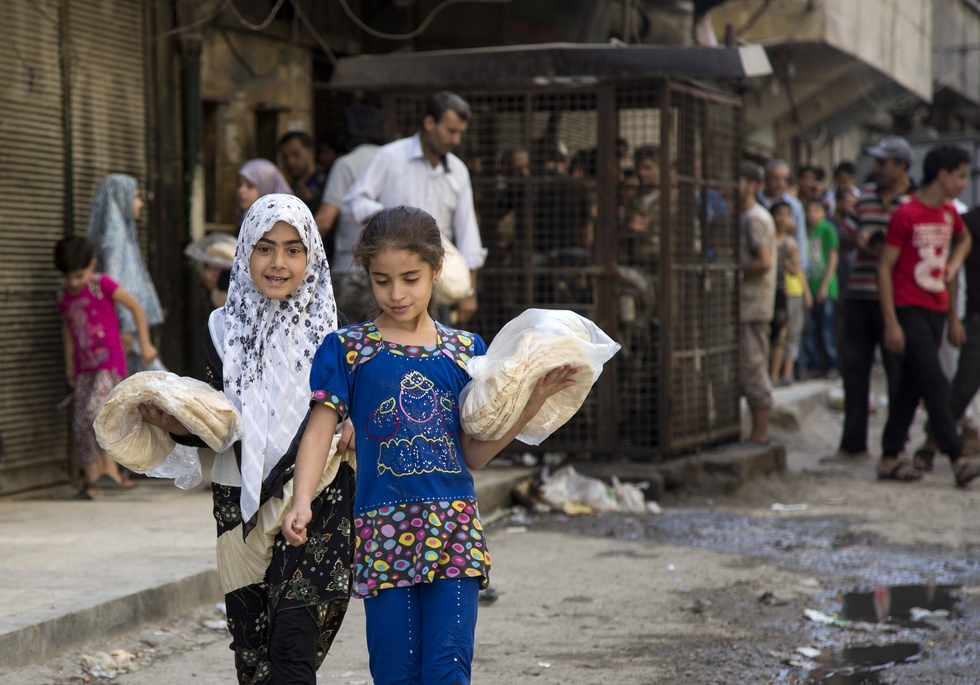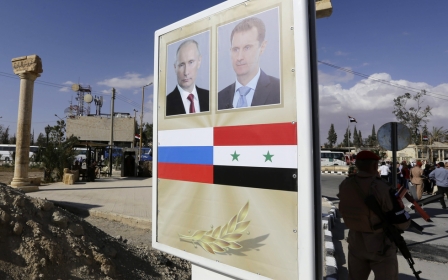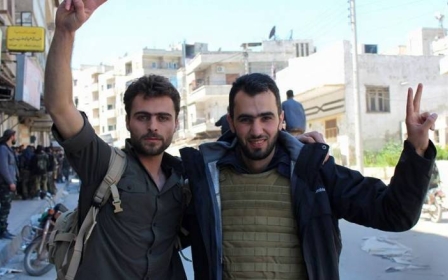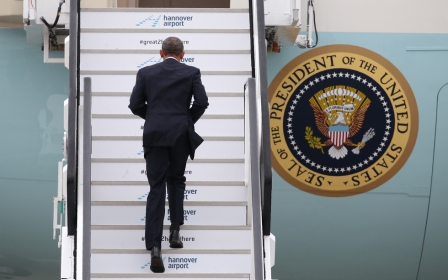Starvation-inducing sieges: A tactic of war in Syria

On 17 July, the forces of Syrian President Bashar al-Assad, backed by the Syrian Kurdish YPG militias and fighters from the Lebanese militant group Hezbollah, seized Castello Road in eastern Aleppo - the only route to and from opposition-controlled neighbourhoods in this area of the city.
This has impeded the distribution of humanitarian aid to at least 200,000-300,000 people living in these neighbourhoods, as well as their evacuation to safer areas.
The blockade comes as inhabitants of eastern Aleppo are living under starvation-inducing siege conditions: staple foods and life-saving medical supplies have become increasingly scarce, and because prices have consequently skyrocketed, most inhabitants of eastern Aleppo face only two options - surrender to pro-Assad forces or die of starvation.
Unfortunately, the situation of the inhabitants of eastern Aleppo is not unique in the country.
Syrians living under siege
According to the estimates of the United Nations Office for the Coordination of Humanitarian Affairs (UNOCHA), as of July 2016, there are 13.5 million people in need of humanitarian aid in Syria, of which over 5.47 million live in the hard-to-reach locations, including 550,000 people who live in 18 besieged locations – as designated by UNOCHA.
Many observers, however, argue that UNOCHA underestimates the number of besieged locations, as well as the size of the Syrian population living under siege by pro-Assad forces, opposition -groups, and the self-proclaimed Islamic State (IS).
Among these observers is Siege Watch, a joint initiative of PAX and The Syria Institute that aims to provide the international community with up-to-date information on Syria’s besieged communities.
So far, delivering humanitarian aid to these communities has proven difficult: UN convoys and those of its partners are subject to the discretion of the government led by Assad, who has denied the delivery of humanitarian aid to people living under sieges despite the fact that UN Security Council (UNSC) resolutions 2139 (2014), 2165 (2014), 2191 (2014), 2254 (2015) and 2258 (2015) authorise UN agencies and their partners to deliver aid to these areas without the consent of the leadership.
The inability of the UN to deliver humanitarian aid to Syrians living in besieged locations generated international outcry following two events: the delayed UN response to the siege of Madaya, a Syrian town near the Syrian-Lebanese border; and the revision of the 2016 Humanitarian Response Plan for Syria (for a critical analysis of said revision, see here).
In January 2016, in an open letter addressed to Stephen O'Brien, the Under-Secretary-General for Humanitarian Affairs and Emergency Relief Coordinator of UNOCHA, 112 aid workers living in besieged areas in Syria accused the UN of becoming “a political tool of war,” and argued the following: “The leadership’s ‘surrender or starve policy’ is killing us. But instead of using your voice to oppose it, you are stamping a UN seal of approval on the siege.”
Furthermore, the letter reads: “For those who still had faith in the impartiality of the UN, the final straw came a few weeks ago. News was confirmed that your staff had agreed to a last-minute request from the Assad leadership to remove the words ‘siege’ or ‘besieged’ from all 64 pages of your Humanitarian Response Plan for 2016 - the UN’s key fundraising document.”
Soon after the publication of the letter in question, O’Brien wrote a note in which he asserted: “I can assure you that the UN is neither too close to any party nor acting in such a way to encourage the use of siege tactics. It is our duty to act impartially, neutrally and independently, and to have contact with all parties to negotiate unimpeded and safe access to those who are vulnerable and in need, regardless of how or why their need arises.”
Moreover, in his latest statement to the UNSC, O’Brien affirmed that “organising the delivery of aid must remain the responsibility of the UN and its partners based on need, and not subject to political or other considerations".
In May 2016, over 5.5 million Syrians benefited from UN food deliveries, and almost 1.5 million were recipients of medical procedures. Still, some continue to argue that UN representatives are wary of alienating the Assad leadership, and others note that the delivery of humanitarian aid continues to be inconsistent and insufficient due to access restrictions.
Whether the UN has failed to remain impartial is still a matter of debate. What it is clear is that, by using the “surrender of starve policy,” the Syrian leadership and, in fewer cases, armed opposition groups (including IS) are violating UNSC Resolutions 2139 (2014), 2165 (2014), 2191 (2014), 2254 (2015), and 2258 (2015), which call for unhindered humanitarian access and cross-line access to all areas in Syria.
Moreover, these violations signal a clear failure of the UN Security Council, which is the international body mandated to protect civilians in conflict, enforce international humanitarian law and refer cases to the International Criminal Court (ICC) for investigation of possible war crimes.
Today, the Security Council is allowing the Assad leadership and, in fewer instances, opposition groups to systematically starve the Syrian people with impunity.
The failure of the international community
As stated in the 1977 Additional Protocols (Protocol I and Protocol II) to the 1949 Geneva Conventions, the deliberate starvation of civilian population as a method of warfare is a prosecutable war crime.
Furthermore, under Article 23 of the Fourth Geneva Convention, humanitarian aid for civilians should enjoy the right of free passage through battle lines if intended for “children under 15, expectant mothers and maternity cases,” and a broader exemption can be made when all or part of the civilian population in occupied territory is “inadequately supplied”.
These rules govern international armed conflicts, which, according to International Committee of the Red Cross’s commentary to Article 2 of the Geneva Convention I, only exists if two states are directly engaged in conflict, and some non-international armed conflicts (conflicts between states and non-state actors, or between non-state actors).
Unfortunately, these rules do not govern a conflict between the authorities of a state – in this case, the leadership of Assad – and its people – the Syrian people.
Consequently, any Syria conflict-related war crimes prosecution would depend on customary international law prohibitions applicable to non-international armed conflicts.
The ICRC, which monitors compliance of warring parties with the Geneva Conventions, considers the prohibition on deliberately starving civilians to be part of customary international law, regardless of conflict classification – that is to say, notwithstanding whether the conflict is defined as an international armed conflict (IAC) or as a non-international armed conflict (NIAC).
Regrettably, starving civilians as a method of warfare may be prosecuted before the International Criminal Court (ICC) only when committed in an international conflict.
A number of states have deployed armed force on the territory of Syria without the overt consent of the Syrian leadership: Israel (in January 2013, the Israeli Air-Force launched an attack against a convoy carrying anti-aircraft weapons to Hezbollah), and, since September 2014, the United States, Australia, Bahrain, Canada, France, Jordan, Saudi Arabia, Turkey, United Arab Emirates, and the United Kingdom.
These operations, however, did not engage Syrian leadership forces directly, as they were conducted against non-state groups (Hezbollah and IS), and thus do not help classify the Syrian conflict as an international armed conflict.
The consolation: crimes against humanity can be charged regardless of whether there is an armed conflict. Any court with jurisdiction over crimes against humanity can prosecute individuals responsible for the abject conditions in Syria.
As formulated in the ICC statute, the crime against humanity of “extermination” covers not only the direct and intentional mass killing of civilians but also intentionally inflicting conditions of life “calculated to bring about the destruction of part of a population,” including “the deprivation of access to food and medicine” that results in death. This pretty much captures the situation in Syria.
Until the ICC prosecutes President Assad and his aides, as well as those from opposition groups who are perpetrating crimes against humanity, the international community will continue contributing to the perpetuation of the civil war in Syria.
- Tania Ildefonso Ocampos is a Spanish political analyst who specialises in EU strategy in the Middle East. She is a former Schuman trainee (Euro-Med and Middle East Unit of the European Parliament's Directorate-General for External Policies), and holds an MA in Middle Eastern History from Tel Aviv University, Israel.
The views expressed in this article belong to the author and do not necessarily reflect the editorial policy of Middle East Eye.
Photo: Syrian girls carry bags with bread as people queue up outside a bakery in a rebel held neighbourhood in the northern city of Aleppo on 12 July, 2016 (AFP).
New MEE newsletter: Jerusalem Dispatch
Sign up to get the latest insights and analysis on Israel-Palestine, alongside Turkey Unpacked and other MEE newsletters
Middle East Eye delivers independent and unrivalled coverage and analysis of the Middle East, North Africa and beyond. To learn more about republishing this content and the associated fees, please fill out this form. More about MEE can be found here.





